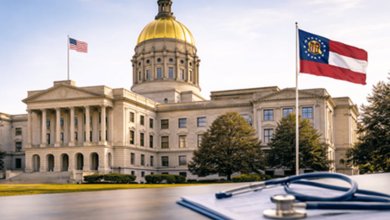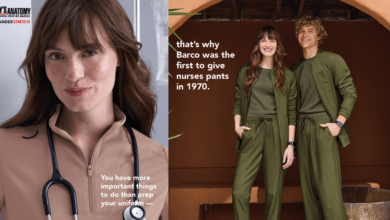Ceremony marks 80 years since first Flying Nightingales flights

The armed forces have commemorated the 80th anniversary of an operation which saw a group of nurses become the first British women in active military service to fly into a war zone.
A week after D-Day, on 13 June 1944, three nurses departed from an airbase in Wiltshire, their planes flanked by Spitfires, across the English Channel to Normandy.
“What they did is still so relevant for us today, both in the military and NHS, so it’s a huge privilege to be here today”
Toni Lynch
Corporal Lydia Alford, leading aircraft woman (LACW) Myra Roberts and LACW Edna Birkbeck – members of the Women’s Auxiliary Air Force (WAAF) – dropped off supplies and medical equipment, before taking on 24 casualties and treating them in the air on their way back to the UK.
The three nurses and others from the WAAF became known as the Flying Nightingales.
After the initial evacuation, and airborne treatment, of injured men by these nurses following D-Day, the WAAF continued to be used for the same purpose until the end of the Second World War.
According to the Royal Air Force (RAF), the Flying Nightingales helped evacuate more than 100,000 men from continental Europe.
Operations by the Flying Nightingale nurses were perilous; due to the Douglas Dakota planes they rode in also carrying military equipment, they could not be marked by the red cross and were therefore fair targets for German military forces.

An RAF trumpeter plays in commemoration of 80 years since the first Flying Nightingales flight
Two Flying Nightingales – LACW Margaret Walsh and LACW Margaret Campbell – died during the operations.
Despite the danger, though, the RAF said that every single man under the care of the Flying Nightingales made it home alive.
The bravery and immense impact of the Flying Nightingales went largely unrecognised after the war, until 2008, when Queen Camilla, at the time Duchess of Cornwall, presented the seven living Flying Nightingales with lifetime achievement awards.
On 13 June 2024, 80 years on, a commemoration of the first Flying Nightingale operation was held at RAF Blakehill Farm, from where the planes took off.
Toni Lynch, chief nursing officer for Royal United Hospitals Bath NHS Trust, who was at the event, said: “What an amazing occasion. It’s a great honour to recognise and celebrate the Flying Nightingales and the bravery that they showed 80 years ago today.
“What they did is still so relevant for us today, both in the military and NHS, so it’s a huge privilege to be here today.”
As well as current RAF reservist nurses and other representatives from the RAF and NHS, family members of some of the original Flying Nightingales were in attendance.
Sheila Lane, corporal Lydia Alford’s niece, said she recalled seeing a news programme at the time about the flights: “On the screen was my Aunty Lydia saluting two officers before boarding an aircraft to go to France. That’s my earliest recollection of her.
“Today means a great deal to me. Growing up, Aunty Lydia was a bit of a heroine and role model for me.
“I have great respect for those who do the same job today.”
Group captain Charlotte Thompson, director of RAF nursing services, added: “It’s a real privilege to be invited here today by 4626 Squadron Royal Auxiliary Air Force, who have put on this wonderful event to commemorate the 80th anniversary of the Flying Nightingales.
“As head of nursing for the RAF, it’s incredible to hear the stories of the aeromedical evacuations these inspiring women undertook on a Dakota, and then look at where we are at now in 2024.”







